
Keeping you in touch with the School of Psychology and Sport Science


Keeping you in touch with the School of Psychology and Sport Science

Welcome to the first edition of the School of Psychology and Sport Science newsletter. As you will hopefully know the School was recently formed following the merger of the previous School of Psychology and the previous School of Sport, Health and Exercise Sciences. We have been delivering Psychology at Bangor since 1963 and Sport and Exercise Science since 1978. In effect the School is now home to a rich sense of history and expertise that spans both domains. Indeed, the title of the newsletter ‘Mind and Body’ captures the synergy and resonance that exists between and within psychology and sport science.
Our purpose is to be recognised globally as a world leading School that interrogates body and mind in the pursuit of better health, well-being and performance for our local, national and international communities. This aspiration is more likely to be realised through our continual desire to engage in world-leading research that has real world impact. As a School we are committed to educating future societal contributors and leaders. We are committed to promoting and enhancing equality, diversity, and inclusion, we have a wonderful sense of community and a genuine care for our students. This newsletter is designed to ensure that we can engage all those associated with our School (and it’s respective former entities) past, present and future with news about the School and to maintain and grow our cosmopolitan influence. In this regard we would welcome news and comment from our alumni, current staff and students to help evolve the newsletter and ensuring that our news includes perspectives, both historical and contemporary, that are representative and inclusive of our community.
The first edition of our newsletter highlights our drive to enhance our Global presence and kudos through a range of activity including our Postgraduate Research International Mobility Exchange (PRIME), social media and podcast activity (i.e., Bangor Sport Science and
Counselling on the Couch), our continued commitment to initiating and organising world leading events and conferences including the International Conference on Mindfulness, the Pan Wales Sport and Exercise PhD Conference and The North Wales Speech and Language Exchange and our continued drive to engage with toplevel sporting, medical and health organisations. Further to this we were delighted to welcome Profs Greg Whyte and Edmund SonugaBarke to deliver engaging public lectures. We are keen to extend our reach and influence in to our local, national and international communities. Our purpose is to be recognised globally as a world leading School that interrogates mind and body in the pursuit of better health, well-being and performance for our local, national and international communities. We are particularly delighted to reignite our engagement with our alumni and hope to welcome alumni who wish to share their journey and experiences with us, either in person and / or in print, in the near future.
We have been working on this newsletter for a while now, hence why this edition is packed with updates, news, research highlights, staff and student success stories. I am extremely grateful to the work of Dr Paloma Mari-Beffa who has led the crusade for a School newsletter, and I am delighted to be able to share this action-packed first edition with you all.
We hope you enjoy this first edition of Mind and Body...

Best wishes Dave
Professor Dave
Richardson Head of School
A delegation from the Football Association of Wales visited Bangor University to hear about the wide range of sport-related performance research taking place within the School.
Academic staff from the world-leading department of sport and exercise science presented a research carousel to FA Wales demonstrating the highly impactful work the team do. The work encompasses eveything from supporting mental health in professional football, talent development and performance, injury prevention in female footballers, to improving player welfare in football. The visit also offered the opportunity for us to update FA Wales on the developments of the North Wales Medical School and the extensive provision of coach and practitioner training that the university provides.
“As part of our High-Performance strategy, we are committed to driving applied insights through our Centre for Football Research to make informed decisions across our male and female national teams. This visit to Bangor University enables us to connect to world-leading academics who can contribute to developing our environment and players”
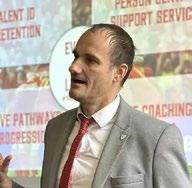
Dr David Adams, FAW Chief Football Officer / Technical Director
Head of School, Professor Dave Richardson commented, “Our research covers performance enhancement, mental health support, player development and player and athlete welfare across the men’s, women’s, and junior football, so the visit was a great opportunity to showcase our impactful work. We are keen to develop a more strategic relationship with the Football Association of Wales so that our work can help inform policy and practice.”.

The School of Psychology and Sport Science have created a brand-new ‘Bangor Sport Science’ monthly podcast which invites a range of guests to provide expert insights on a variety of topics related to health and performance.
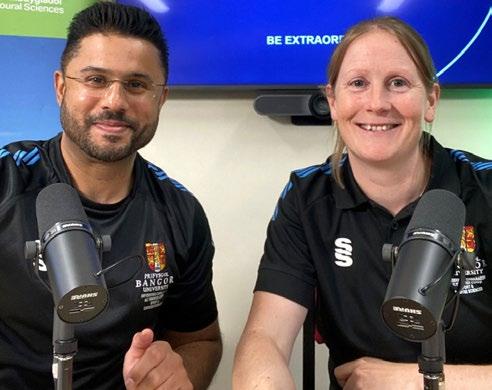
This counselling podcast launched on 8th February and is a space for aspiring, trainee, and experienced counsellors to explore various perspectives and topics in therapy including careers in counselling, children’s counselling, language in therapy, self-care and technology in counselling.
More information on how to apply for the Counselling MSc at Bangor: www.bangor.ac.uk/courses/postgraduate-taught/counselling-msc
Qualified counsellors can now apply for our PGDip in Counselling Children & Young People (4-18 years): www.bangor.ac.uk/courses/ postgraduate-taught/counselling-children-and-young-people-418-years-pgdip
In the first ever episode, the host Dr. Aamer Sandoo (Senior Lecturer in Sport and Exercise Physiology) welcomes Dr Seren Evans to discuss non-contact injuries in Rugby Union and why it is important to understand the hidden dangers of concussion in the sport. The second episode welcomes Dr Vicky Gottwald to share her expertise about how skill acquisition practitioners provide expertise in relation to key skill acquisition phenomena and talks about myths in coaching as well as areas of good practice. The podcast can be found on all major podcasting platforms and, uniquely, all podcasts are also filmed. Aamer says “The ability to watch each show allows greater connection with the audience and brings the human element into these podcasts. The option to listen to the audio or watch the video also provides flexibility with how the audience interacts with the content”. Episodes will be released each month and will include bonus episodes.
You can listen to the first episode here: shows.acast.com/bangor-sport-science/episodes/tacklingthe-unseen-non-contact-injuries-in-rugby-union
or watch the video here: www.youtube.com/watch?v=JOqx8Bhwyd4
while the second episode can be found here: shows.acast.com/653003c293a2360012d3efc4/ episodes/skill-acquisition-the-missing-link
and the video here: www.youtube.com/watch?v=xpXqC0VRU8k

For further information, please contact
Professor Fay Short. f.short@bangor.ac.uk
Follow us on shows.acast.com/counsellors-on-the-couch
Don’t miss out on the opportunity to gain valuable insights into the ever-evolving world of counselling.

On the 9th of May, Bangor University’s MSc Counselling team, funded by B-Enterprising, hosted a “Counselling Empowerment Day.” This event aimed to enhance the skills of qualified, trainee, and aspiring counsellors, focusing on both counselling and business acumen. B-Enterprising supports Bangor University students and Welsh graduates in developing enterprise skills or starting businesses.
The event featured guest speakers who discussed specialised areas of counselling, personal career development, and business planning. Keynote speakers Ken Kelly and Rory Lees-Oakes from “Counselling Tutor” emphasised the importance of finding your niche. Other experts shared their experiences in areas such as LGBTQ+ issues, diversity, and sports mental health. Presenters included Jack Jackson (University Wellbeing Services), James Donaldson (Elite Sports and Media), Neal Trotman (Sports Mental Health), and Danny Jones (Children and Young People). They provided insights into working with clients facing various challenges and discussed their work in diverse settings like schools, universities, military, and private practice.
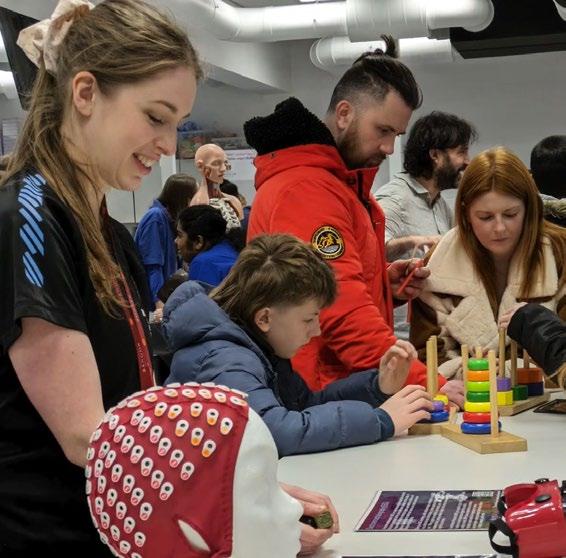
Additionally, presentations covered financial support for private practice and developing niche-focused business models. Alan Edwards, Head of International Student Services, along with international alumni, discussed visa requirements and employment for graduates.
The event was highly successful, with 70 in-person and 100 online attendees. Feedback was overwhelmingly positive, highlighting its impact on career planning and networking opportunities. Presenters praised the event’s organisation and its advocacy for future therapists. Planning for next year’s Counselling Empowerment Day is already underway.
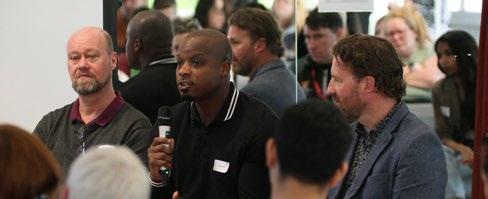
Once again, the highly popular Hidden Worlds of Science festival gave visitors, young and old, an opportunity for some hands-on science on Saturday the 9th of March.
From botanical painting for children to interactive displays by the BioComposites Centre and Treborth Botanic Garden, from the ‘spot the skull’ activity to a handwashing demo, there was an array of activities for everyone.
Our School had a strong presence with the popular BATAK, the Electrophysiological displays and hand test experiments. This was an extremely busy day, and huge thanks goes to Leah HaddenPurnell, Aamer Sandoo, Simone Lira Calabrich, Seren Evans, Benjamin Govier and Ronan Timircan among others for their incredible efforts in welcoming our visitors. Totally amazing work!
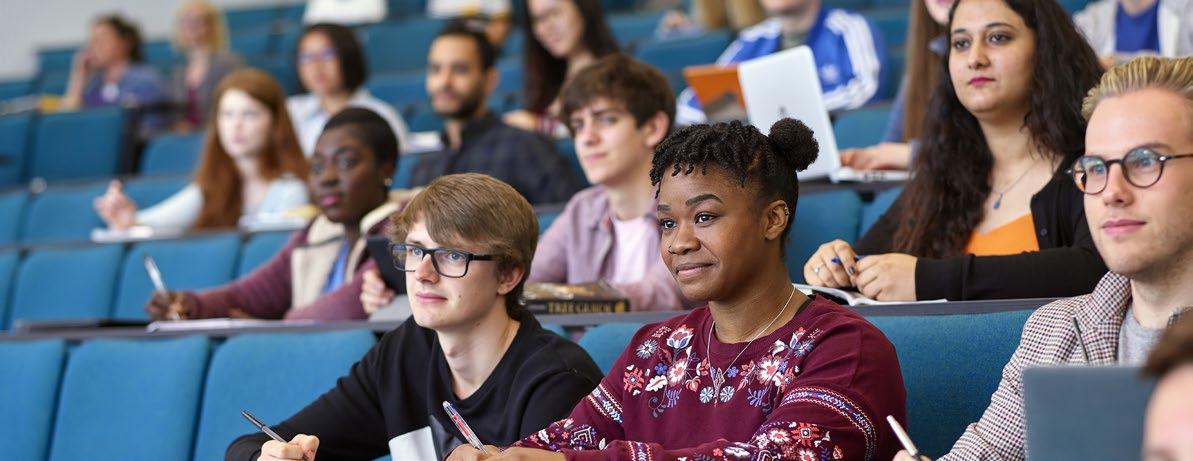
Bangor University is included once again among the world’s top universities for the study of five subjects in the latest edition of the QS World University Rankings by Subject.
The 2024 edition of the QS World University Rankings by Subject, released in April by global higher education analyst QS Quacquarelli Symonds, provides independent comparative analysis on the performance of more than 16,400 individual university programmes, taken by students at more than 1,500 universities in 96 locations around the world, across 55 academic disciplines and five broad faculty areas. The subject rankings are based on five key metrics. Reputation indicators are compiled from responses of more than 240,000 employers and academics to QS surveys while Citations per Paper and H-Index measure research impact and productivity. International Research Network (IRN) is used to assess cross-border research collaboration. We are proud to share that Psychology appears among the world’s top 300 elite universities offering the subject.
Commenting on the results Professor Oliver Turnbull, Deputy Vice-Chancellor said,“This is a comprehensive league table, based on both teaching and research, and helps reflect our reputation among the world’s top universities. League tables like this also show how our research has impact around the globe, and helps our reputation internationally, attracting students to study here in North Wales”
QS Senior Vice President Ben Sowter said, “QS’ analysis of performance trends across nearly 16,000 university departments worldwide continues to illuminate factors influencing the quality of higher education institutions globally. An international outlook remains paramount, manifested through diversity of students, faculty body and research relationships. Additionally, universities experiencing upward mobility have benefited from sustained, targeted investment, highlightingtheimportanceofgovernmentsupport.Meanwhile, the development of partnerships with industry correlates with improved performance in employment and research.”
Sowter continued, “This examination of university performance comes at a pivotal time given the challenges posed by global inflation and geopolitical instability. The latter, identified by The World Economic Forum in 2023 as a major risk to organisations worldwide, presents considerable, unforeseeable challenges and opportunities as more than half the world’s population in more than 50 countries participate in one of the most significant election years in history. Against this backdrop, the importance of safeguarding and supporting higher education and international mobility around the world has never been more essential as it drives societal progress and innovation.”
The School of Psychology and Sport Science recently hosted the Pan-Wales Sport & Exercise Sciences PhD conference, welcoming over 50 PhD researchers and faculty from Welsh universities. The conference was developed to increase collaborative research within sport and exercise science in Wales, building on the success of the Sport and Exercise Science pathway in the ESRC Welsh Graduate School for Social Sciences. Over the two days, the conference offered postgraduates a valuable opportunity to meet, network, and present their research findings.
In addition to the presentations, the conference also had a large focus on research training and developing postgraduates into high-quality researchers. Attendees participated in workshops on grant writing, co-creating research with stakeholders and reflective practice. The event concluded with an ‘ask the panel’ session which led to some excellent debate and insights.
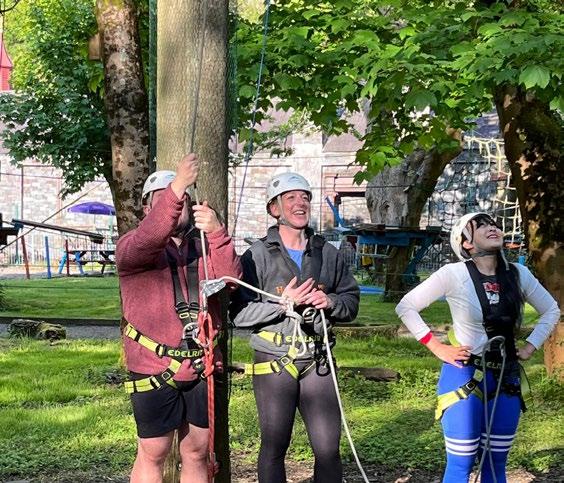
Following the academic events, attendees had the opportunity to experience some of the best that North Wales has to offer. An evening of high ropes and team building was provided at Ropeworks in Llanberis, followed by a lakeside hog roast at Llyn Padarn.
Conference organiser Dr Ross Roberts from the School, and sport and exercise science pathway convenor for the Welsh Graduate School for Social Sciences said,
“It has been great to see so many high-quality young researchers presenting and discussing their research in a supportive and friendly environment. The research training sessions were exceptionally well-received, with students appreciating the development opportunities they offered. The evening activities in Llanberis were particularly special, and a perfect example of what the event is all about, and its significance for the postgraduate researcher community. We’re all looking forward to next year’s conference!”
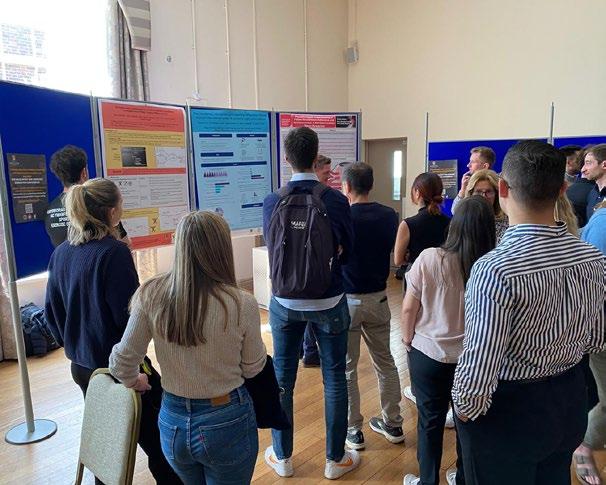
Our Institute for Applied Human Physiology (IAHP) hosted the Wales Integrated and Applied Physiology Symposium bringing together approximately 50 staff and postgraduate researchers from Welsh Universities, and guests from the Universities of Bristol, Birmingham, and Innsbruck.
The symposium was a mix of presentations from seasoned academics and Early Career Researchers (ECRs) sharing their recent research findings and methods. The day’s highlight was the Physiological Society sponsored 3-minute thesis student competition. The format proved to be the perfect energetic start to the symposium.
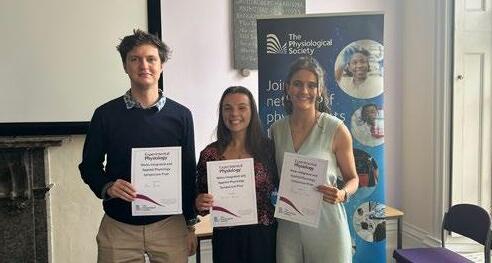
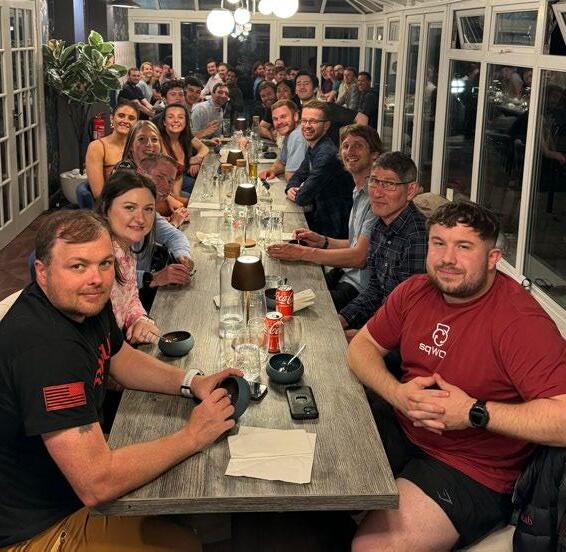
Six members of staff and eight postgraduate researchers from our research Institute for the Psychology of Elite Performance (IPEP) will be attending the European Federation of Sport and Exercise Psychology conference in July 2024 in Austria.
This major event happens every two years and is one of the biggest meetings of sport, exercise and performance psychology researchers and practitioners in the world. The team have been invited to deliver 14 presentations and workshops across the week covering their cuttingedge sport and performance research spanning personality, group dynamics, attention, performing under pressure, and public speaking anxiety. IPEP have a proud history of success at this event with recent graduate Francesca Mottola (PhD in Sport and Exercise Science, 2021) picking up a young investigator award at the 2019 event.
PhD students within the School of Psychology and Sport Science are enrolled in a teacher training programme which enables them to develop their teaching skills whilst supporting our undergraduate skills modules.
The teacher training programme has received commendations from the British Psychological Society (BPS) and from Advance HE, and sees our PhD students commit to a 200-hour training programme which includes running seminar groups, marking assignments, attending CPD workshops, and engaging in peer observations, all whilst being closely mentored by a member of the School’s Teaching Team.
On completion of the programme, PhD students are able to apply for recognition of their teaching with Advance HE, and in 2023/2024, seven of our students received either HEA Associate Fellowship or HEA Fellowship. Becoming an HEA Associate Fellow or Fellow evidences a commitment to teaching, learning and the student experience through engagement in a practical process which encourages research, reflection and development. It provides a valuable measure of success within the higher education sector and shows that our PhD students are committed to the highest standards of teaching and the support of learning.
HEA Associate Fellow:
Wenwen Yang
Molly Hewitt
Bethan Naunton Morgan
Jade Witten
Judit Elias Masiques
Harry Piper
HEA Fellow:
Sam Leaney
In addition, we also had a record number of staff who also succeeded in getting their HEA fellowship statuses. Congratulations to all!
HEA Principal Fellow
Gemma Griffith
Awel Vaughan-Evans
HEA Senior Fellow
Azlina Amir Kassim
HEA Fellow
Simone Lira Calabrich
Rossela Roberts
Amy Gaglia Essletzbichler
Suzy Clarkson
Millicent Blandford-Elliott
Helena O’Boyle
Cat Atherton
Kevin Deyna-Jones
Rachel Curtis
Rachel Newey
Matthew Boulter


This year, our School was fantastically represented in the Student Led Teaching Awards, and we would like to offer our warmest congratulations to our nominees and WINNERS!
Teacher of the Year:
Sam Oliver
Beverley Pickard-Jones
Laura Jastrzab
Rob Ward
Fay Short
George Houghton
Mihela Erjavec
Gemma Griffith
Tracey Lloyd
Alex Baxendale
Rachel Newey
Jo Dunton
Maggie Hoerger
Simone Lira Calabrich
Nia Griffith
Tommie Du Preez
Outstanding
Postgraduate who Teaches:
Gemma Griffith
Hamid Bagheri
Laurent Gorce
Thipkanlaya Jaianu
Charlotte Welch
James Hodgetts
Dissertation Supervisor of the Year:
Rachel Newey
Ross Roberts WINNER!
Sam Jones
Sam Oliver
Simon Watt
Tim Woodman
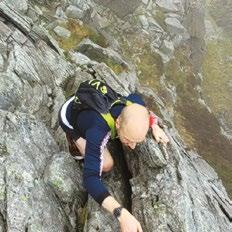

Support Staff Member:
Sam Oliver
Liam Hardman
Alex Baxendale
Outstanding
Pastoral Support:
Tracey Lloyd
Nia Griffith
Unsung Hero Award:
Tracey Lloyd
Alex Baxendale
Nia Griffith
Student Voice Award:
Newey
Rauwolf
Inclusivity Champion:

This has been a unique year where we have seen our academic family greatly expanded.
meet our latest arrivals
Dr. Alex Baxendale

Hello, I’m Alex! I have been around Bangor for some time doing my undergraduate and Masters here since 2011, and finishing my PhD here last year where I explored the cognitive processes involved in math anxiety and numerical processing.
I have been teaching Psychology for over 3 years working in the University’s International College where I learned many useful skills in the classroom alongside being able to design many of the modules and courses. I have always had a passion for talking about science and get (maybe a little too) enthusiastic – enough to win a BPS award for science communication a few years ago! I’m really excited to be a part of the School of Psychology and Sport Science and have been really enjoying my time here so far!
Dr. Geoff Coombs

Geoff’s research program examines the integrative cardiorespiratory aspects of human health and performance. His specific research interests include human health throughout the lifespan and how the environment influences that process – specifically, the human health impacts of climate change as well as the benefits of physical activity on cardiovascular health during the aging process.
Mrs. Leah Hadden-Purnell

Leah Hadden-Purnell is a Psychology lecturer specializing in literacy development among bilingual children. She is currently working on her PhD thesis, which delves into the complexities of Welsh-English bilingualism, with a specific focus on literacy disorders in this context.
In addition to her academic pursuits, she serves as the Welsh School Liaison for the Department of Psychology. Passionate about the Welsh language and fostering a strong Welsh community within the school, she initiated an event to celebrate Saint David’s Day, the patron saint of Wales. This event included a raffle that successfully raised over £140 for the charity Mind, reflecting her commitment to supporting mental health initiatives.
Outside of her professional life, she is an avid cyclist and enjoys staying active. Cycling not only keeps her fit but also allows her to explore the beautiful Welsh countryside, further deepening her connection to the local community and environment.
Mark Roberts

For the last 5 years I have worked as the EEG lab manager for Experimental Psychology at Oxford University. Prior to that I worked for the School of Psychology at Bangor for 18 years, in many roles, the majority involving electrophysiology. I am looking forward to returning to Bangor and helping out wherever I can.


I am a lecturer in Sport and Exercise Sciences specialising in Sports Biomechanics. My research focusses on biomechanics of females, particularly in relation to how the breasts impact the female body. I am currently working to improve methods used to model females for simulation analysis. I also have an interest in breast health and bra education and have been working with athletes for several years delivering workshops and bra prescription to improve the athlete experience.
Dr. Seren Evans

Seren Evans is a Lecturer in Sports, Health and Exercise Science and a member of the Institute of Applied Human Physiology, with her PhD having focused on adopting a multifactorial approach to injury risk identification within Rugby Union. Currently, she is also a Research Associate funded by World Rugby to conduct injury surveillance and to explore deeper themes surrounding injury risk within Girls and Women’s Rugby Union (Welsh Injury Surveillance in Girls Youth Rugby: WISGYR). She has also recently completed her Physiotherapy degree at Glyndwr University, hoping to integrate this knowledge into her research and teachings.
In addition, she serves as the Welsh School Liaison for the Department of Sport Science; as a first language Welsh speaker, and having her PhD funded by the Coleg Cymraeg, this has led to many opportunities within and beyond academia, and is therefore passionate about showing the importance of Welsh culture in academia, research and the workplace.
Outside of her professional life, she is an avid CrossFitter and Weightlifter, practicing what she preaches when it comes to exercise and health.
My academic interests lie in the pragmatics of victim language in forensic settings; especially figurative language, and especially in sexual violence scenarios. Outside of work, I am an avid reader of literary fiction, a pole dancer, and an involved companion to my Dobermann cross puppy.

I am a lecturer in Sport and Exercise Science. My research focuses on two key areas, female physiology, in particular around the menstrual cycle, and immunology. I am proud to be using my research to close the gender data gap in sport science. I am also part of the School’s Equality, Diversity and Inclusivity group and I am passionate about creating equal opportunities throughout our school and in sport science. In my spare time I am on the board of directors for Welsh Weightlifting and take part in weightlifting, hockey and running.

Tirso Gonzalez Alam trained as a clinical neuropsychologist in the National Autonomous University of Mexico, working with stroke and epilepsy patients, where he developed an interest for the lateralization of cognitive functions.
Tirso is interested in understanding the large-scale network organisation of the cerebral cortex, and how patterns of hemispheric differences in this hierarchy give rise to cognitive systems. His recent published work on these topics has examined how differences in a high-dimensional connectivity space between left and right hemisphere networks involved in higherorder cognition predict semantic and visual reasoning, and how distinct pathways of connectivity from visual cortex to the default mode network support semantic and spatial cognition. Lately, he is interested in understanding how the semantic cognition system deals with complex sense-making phenomena where more than one unit of meaning must be processed in order for understanding to take place, like in metaphors, ambiguity-based jokes, stories, sarcasm and irony. He is passionate about open science and data, as well as increasing access to science to underrepresented minorities.
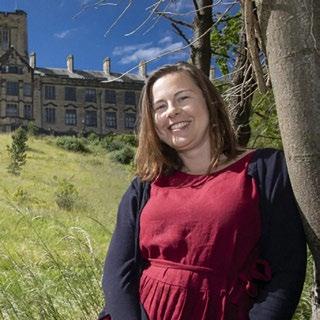
This year we have appointed Dr Gemma Griffith and Dr Sophie Sansom as co-directors for the Centre for Mindfulness Research and Practice.
As co-Directors Gemma will provide leadership for CMRP across its activity within and across the School and College at Bangor University, and Sophie will provide leadership for CMRP across its activity with external collaborators and organisations including The Mindfulness Network.
Congratulations!
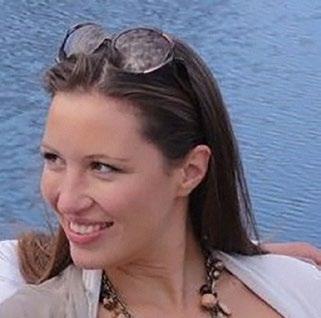
By Dr. Joe Butler, NIHR ARC Research Fellow & Senior Lecturer in Psychology at University of Sunderland
I currently work in the North East of England as a National Institute of Health Research Applied Research Collaborative Fellow (NIHR ARC Fellow), Psychology Senior Lecturer, and Vice Chancellor’s Research Fellow. I am an early career researcher, with an interest in i) developing theoretically-based tools for the assessment of brain health, and ii) how factors such as COVID19 infection or Down Syndrome affect brain health. I often reflect on how my career has been shaped by my time at Bangor. Indeed, my career has benefited, and continues to benefit, from my time at Bangor as a student (and later staff).
To set the scene, I attended what was then the University of Wales, Bangor, to study Psychology with Clinical and Health Psychology. I was a first-generation student, the first in my entire family (blood line even!) to attend university. I had also just left the army, still officially on resettlement leave during Freshers’ Week, after serving eight years in the Royal Engineers. I can still vividly remember arriving at the train station and Ffriddoedd site, on that first day of Freshers Week as a still young 24-year-old. I had no idea how much I would develop and grow whilst at Bangor.
And even now, having left Bangor seven years ago, I am immensely thankful for the opportunities Bangor provided both curricular and extra-curricular. Like many psychology students, I initially aimed to become a Clinical Psychologist but found myself increasingly drawn to research. One aspect that truly stands out in hindsight is the number of internationally respected researchers in the department, a resource I took for granted at the time but also developed this interest in research.
When reflecting on my time at Bangor, in addition to excellent teaching, one of the things that greatly benefited my personal development, was the wide variety of clubs and societies. I was fortunate enough to take part in activities such as climbing, photography, and scuba diving, as well as mixed martial arts training with a local club. I also spent two
years on the Students’ Union executive board, first as the Students with Disabilities Officer and later as a Trustee. All of these experiences were extremely formative and largely shaped who I am today.
After completing my BSc and MSc, I spent a year away before returning to Bangor as a PhD student under the supervision of Dr Giovanni d’Avossa and Prof. Bob Rafal. The high level of training I received during my PhD, and the skills and confidence I gained during that time, have really influenced my research interests, working at the intersection of applied and theoretical psychology.
My time at Bangor laid a solid foundation for my career, and I am grateful for the support and guidance I received there, as well as the many lifelong friends I made, including my partner of eight years who I met in the department. I am also extremely fortunate to have ongoing collaborations with people in the department, and so Bangor Psychology continues to provide me with opportunities and shape my career even after I have left.

Dr. Joe Butler
Mikołaj Michał Nawrot, won the University’s Enterprise Excellence Award 2023 which is awarded to only one student at Bangor University by the employability service for outstanding development of enterprise skills throughout their university experience.
Michał has now created Synargize, a consultancy which will work with companies using an academic and evidence-based approach to help them scientifically drive sales through the technological marketing techniques that they use.
Arriving in the UK with his family as a teenager, Michał had been working in hospitality until the pandemic struck, when he saw that he had an opportunity to follow his dream and study psychology at Bangor University.
Having toyed with the idea of forming a business in the summer between his second and third years, on entering his third year, Michał decided to take full advantage of all the entrepreneurial support and activities offered by Bangor University.
He led a project team in the University’s innovative Enterprise by Design/ BUILT competition. The competition sees multidisciplinary teams of students working alongside national and international business advisors to solve real industrial or commercial challenges. Michał’s Enterprise by Design team partnered with a local farm to extend the ways they could interact with their customers.
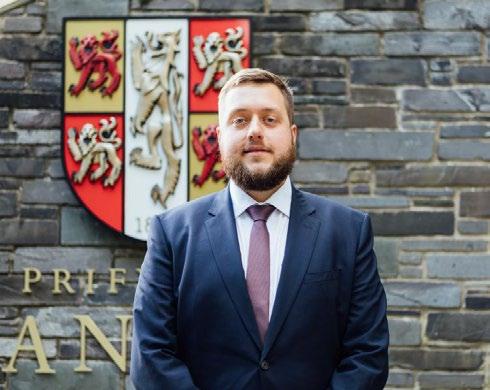
Michał commented:
‘’Being part of Enterprise by Design/BUILT has been a great opportunity to meet peers with a similar entrepreneurial mentality from the business and engineering schools. We had the honour of being mentored by experts in many industries and this has been an invaluable experience to enhance my leadership skills.’’
Since forming his business, Michał has also received support from Bangor University through its involvement in the psychology strand of the Celtic Advanced Life Science Innovation Network (CALIN) a largescale European-funded research network. He also received support from the University’s B-Enterprising team and Enterprise Fund which is partly funded by Santander Universities.
‘’B-Enterprising at Bangor University has a fantastic team who are constantly making resources available to support students in their entrepreneurial ventures. Additionally, being part of project CALIN has provided the scope for a research and evidence-based approach to my business,’’ he added.
Planning to add a marketing Masters level degree to his qualifications, Michał sees how his understanding of psychology can help him to work with companies to adopt innovative solutions. Michał was pleased to be accepted to study at Bangor less than 10 years since arriving in Britain. He really appreciates the University’s location between the mountains of Eryri and the sea. He added,
“Aswellasbeinginafantasticlocation,theUniversityisreallyrooted in the local community, and I really enjoyed the opportunities to work with and get to know some really knowledgeable local businesses.‘’
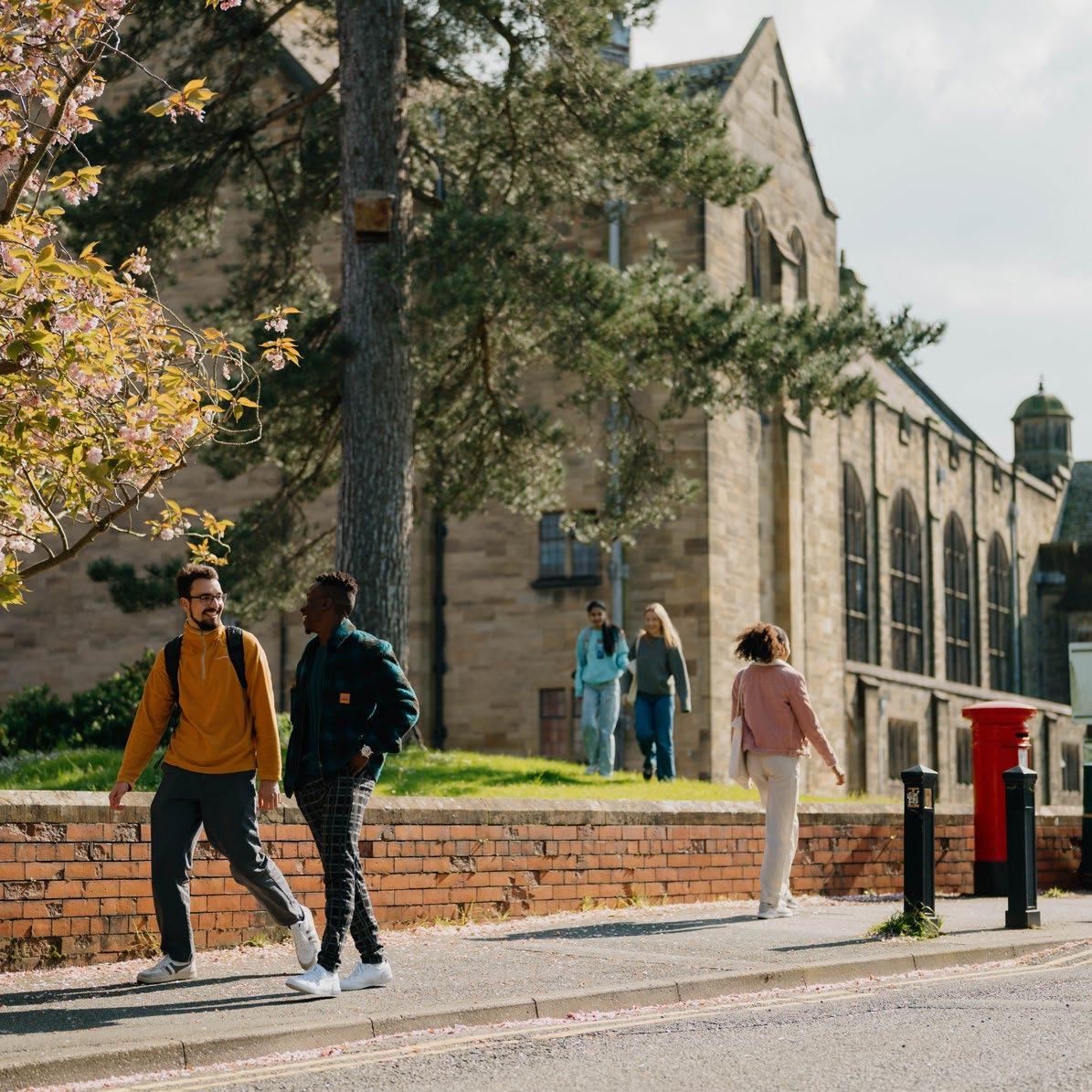
Professor Edmund Sonuga-Barke presented in the Distinguished Alumni Lecture series in May this year.
Edmund Sonuga–Barke, Professor of Developmental Psychology, Psychiatry and Neuroscience at King’s College, London, graduated from Bangor University in 1984 with a degree in Psychology. He went on to embark on an illustrious career, which has influenced how many people view attention deficit hyperactivity disorder (ADHD). His thought-provoking and engaging talk drew on his own experiences growing up, discussed his research and referenced the need to shift our focus from ‘fixing’ dysfunction to accepting and supporting neurodivergence to promote successful development.
Prior to his public lecture, which attracted an audience of over 200, Professor Sonuga-Barke spent the day with the School of Psychology and Sport Science’s staff and researchers to learn about the work within the School.
Commenting on the visit, Professor Dave Richardson, Head of School, said, “We were delighted to welcome Professor Sonuga-Barke back to Bangor. As an esteemed specialist in developmental psychology, child mental health and neurodevelopment disorders, his visit and public lecture aligns well with our current work in human cognition across the lifespan and we are honoured that he is able to return to Bangor and share his extensive knowledge and expertise with us.”
Professor Sonuga-Barke said, “It was wonderful to come back to Bangor. I especially loved hearing about all the fantastic research currently being conducted in the School. I got a great sense of energy and enthusiasm about their work, from everyone I met. I was especially happy to see the really innovative and exciting work being carried out in the field of neurodevelopment.”
“The experience of being invited back as a distinguished alumnus was very poignant for me.”
“I failed academically at school, and it was only through the actions of Professor Tim Miles, the pioneering dyslexia researcher, that I got a University education at all. Realising that dyslexic kids were at that time being failed by the education system, he implemented a scheme, whereby each year he was able to offer one or two people with dyslexia places on the psychology degree course: The condition being that they went and got two A’ Levels, with a minimum pass grade. I scraped through but never looked back. My time at Bangor truly transformed my life and shaped my mind and I am eternally grateful to this institution for starting off what has been an incredible adventure.”
Emma Marshall, Head of Development and Alumni Relations, said, “Professor Sonuga-Barke’s story of his journey to university and his achievements beyond Bangor is truly inspirational and it was great to hear more about his fascinating work in the field of ADHD. We’re very proud to have him as an alumnus!”
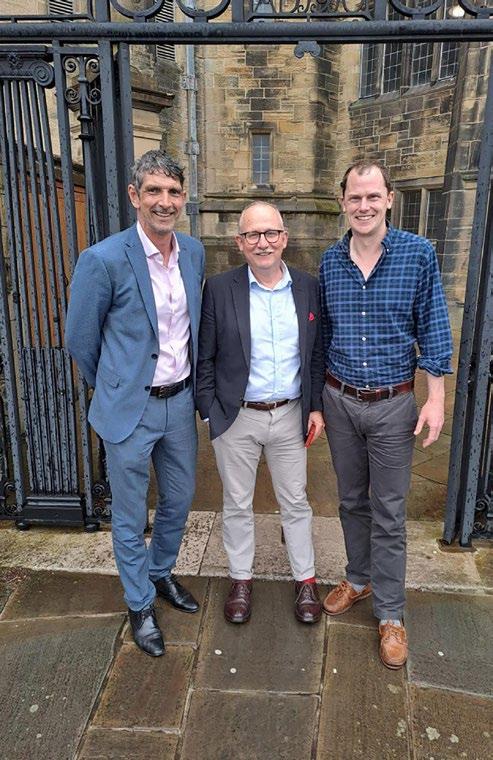
Congratulations to our top students from each of the 2022-23 Postgraduate Courses:
MSc Sport and Exercise Science: Robin Locke
MSc Performance Psychology: Elizabeth Darville
MRes Sport and Exercise Science: Rubab Abdi
MSc Mindfulness Based Approaches: Ruth McDonald
MSc Teaching Mindfulness: David McCormack
MSc Clinical and Health Psychology: Bethan Louise Powell
MSc Neuroimaging: Kaitlin Marian Corry
MSc Principles of Clinical Neuropsychology: Kiran Naomi Morris
MSc Psychology: Freya Constance Losvik
MSc Psychological Research: Harry Loraine
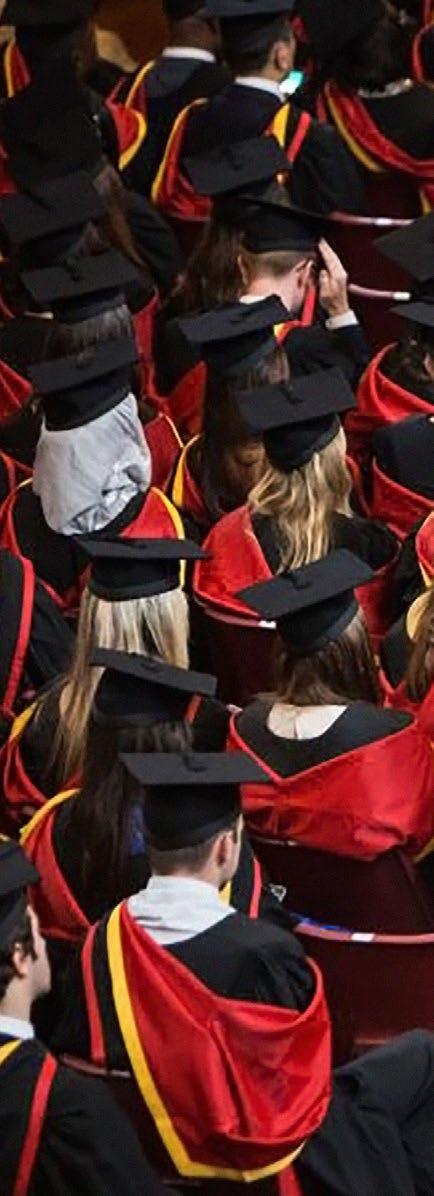
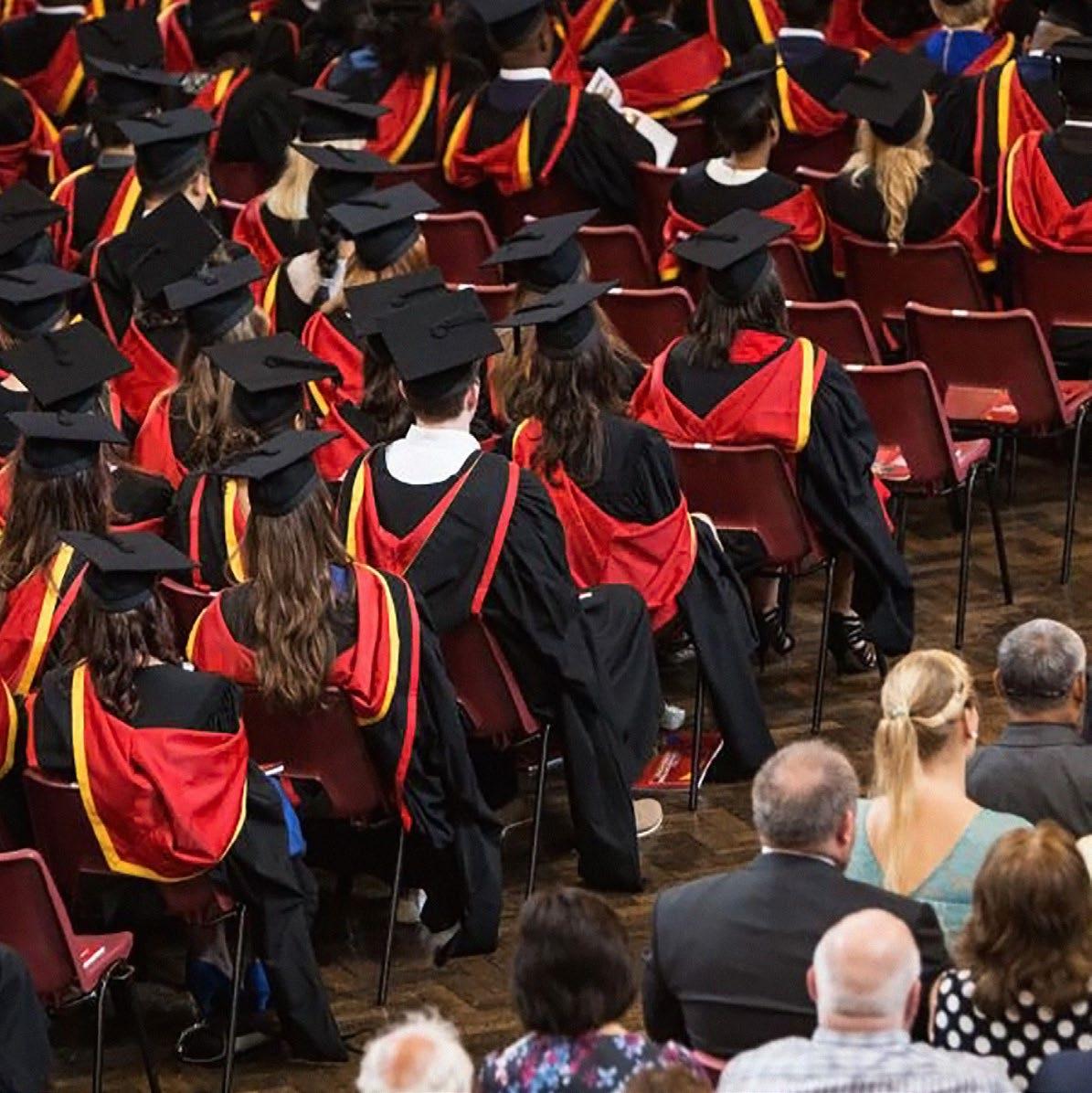
Extending that achievement to the full marathon is where the psychology really kicks in. Much of the module focusses on motivation, locus of control, habits etc. and marathon success is as much about the psychological as the physical preparation. So, who better to bring in to talk to our students than Prof Greg Whyte OBE for a lecture on how to achieve the impossible? Greg is an authority on Sport & Exercise Physiology and Performance, an internationally recognised expert in the field having published over 350 peer reviewed papers, and a leading media commentator. Greg has extensive professional experience assessing, treating and improving the performance of patients, sporting enthusiasts and athletes ranging from cancer sufferers to celebrities attempting their first mountain summit to Gold medal seeking Olympians. Greg is wellknown for his involvement in Sport & Comic Relief, and Children in Need, since 2006 Greg has applied his sports science work to assist various celebrities in completing some of the toughest challenges. Greg has trained, motivated and successfully coached 39 Sport & Comic Relief, and Children in Need Challenges helping raise over £65 million for charity, most recently supporting Vernon Kay in his four day, 115 mile, ultramarathon challenge. After his incredibly inspiring public talk on the 18th April, Greg joined the Born to Run students the next day on one of their ‘Adventure Runs’, this time through Newborough Forest.
Mimi White, a student on the module wrote about the experience in her blog: “Delivered from a place of incredible first-hand experiences he navigated his experiences with achieving the impossible, how he had gone about this, the strategies and the experiences he’d acquired through these epic endeavours. It was sweet to be out running the next day with everyone from undergrad pals, to Professors, Heads of school, Greg himself and not to forget Coco (Ross’s doggo).”
Putting all their learning and training into practice, many of the students have now gone on to complete their marathons and we are hugely proud of them all. This latest cohort join a hall of fame of almost 100 final year students who have completed this challenge,
You can read more about Jess Howard’s reflections on the experience here on our alumni website’ www.bangor.ac.uk/alumni/alumni-profiles/jess-howard
Kelly Stokes, MSc student enrolled in the distance learning Performance Psychology course, has recently written an article for a Triathlon magazine on her research project with Dr. Eleri Jones. They collected data with new mums on their experiences of returning to triathlon post-partum. Kelly herself is a triathlete, coach and has a young child so very relevant to her. This research will also be presenting at Women in Sport and Exercise Academic Network (WiSEAN) Conference 26th - 27th June 2024.

The Centre for Mindfulness Research and Practice will host this year’s International Conference on Mindfulness at Pontio.
Conference theme and participation:
This year’s theme ‘Mindfulness in a Changing World’ will deliver insightful discussions on the evolving landscape of mindfulness practice and research. Colleagues are encouraged to attend, be part of the discussion, engage with thought leaders and contribute to shaping the future of mindfulness.
Financial support available:
To ensure broad participation, bursaries are available to help cover the cost of the conference. Colleagues are particularly encouraged to apply for this financial support.
Stay informed and get involved:
For more information on speakers, the conference programme and additional event details, visit the website ICM:2024 website, which is updated regularly.
Dr Gemma Griffith, Co-Director of the Centre for Mindfulness and Practice, said, “This is the first time Bangor has hosted the International Conference on Mindfulness. Following previous events hosted by universities in Australia, Denmark, Amsterdam, and Rome, we are excited to bring it to the UK for the first time. We welcome everyone, especially those who may find cost a barrier, to apply for bursaries and join us at this significant event.”
To be the first to hear the latest news and announcements, subscribe to the ICM:2024 mailing list.
Learn more and register at: www.internationalmindfulnessconference.com/buy-tickets/

Visceral Mind is an annual 5-day residential Summer School, delivered on our Bangor campus and surrounding area.
It is a functional neuroanatomy course, intended for postgraduate, postdoctoral and early career researchers studying cognitive neuroscience and related disciplines, or clinical, medical and allied health practitioners with membership of an overseeing professional or statutory body.
On the course, functional neuroanatomy is taught in the context of neurological patients with impairments due to focal brain lesions, and hands-on neuroanatomy classes with human brain tissue –to bring neuroanatomy to life and make it relevant to students of cognitive neuroscience.
Learn more and register at:
www.bangor.ac.uk/courses/other-courses/functionalneuroanatomy-course-visceral-mind-summer-school
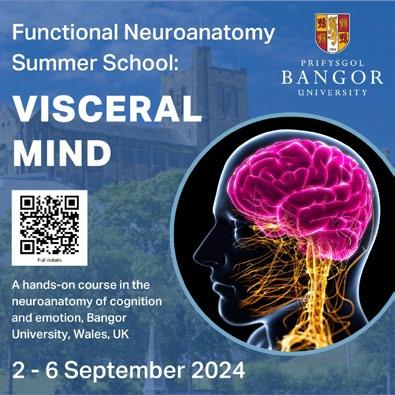
The North Wales Speech and Language Exchange (NWSLE) is a new initiative launched by Dr Sam Jones and Dr Charlie Wiltshire to foster engagement between clinicians, researchers, and members of the public with a personal or professional interest in speech, language, and communication needs, and to promote Bangor University as a world leader in this field.
Our inaugural conference was held at Bangor University on October 17th, 2023. The organising committee comprised Dr. Sam Jones, Dr. Charlie Wiltshire, Dawn Leoni, (Head of Speech and Language Therapy (SLT) for the West Besti Cadwaladr Health Board), and Lauren Salisbury (Clinical lead of the SLT training programme in North Wales, based at Wrexham University).
Following the success of our first conference, our next event will be held in October at Wrexham University, a major training hub for speech and language therapists practicing across North Wales. Celebrating our 140th anniversary, the day will showcase current research at Bangor University, and will involve workshops on public engagement, clinical career development, and applying for collaborative funding opportunities. The event is free and anyone with a professional interest in themes related to speech and language therapy is welcome to attend.
Contact: NWSLE@bangor.ac.uk.


Dr. Alex Baxendale
The Cognitive Basis of Instructional Modality in Math Anxiety and Math Processing
High math anxiety impairs performance by diverting attention through negative self-talk, impacting phonological working memory. This thesis tests auditory instructions to improve focus but finds them ineffective for simple tasks. For complex tasks, high-anxiety individuals benefit from auditory instructions, revealing differences in numerical processing based on task complexity and working memory demands.
Supervisors:
Dr. Paloma Mari-Beffa & Dr. Emily Roberts-Tyler

Dr. Alex McWilliam
Public Speaking Anxiety: Past, Present, and Future
Public speaking anxiety (PSA) affects many, limiting opportunities and performance. This thesis reviews PSA research, highlights measurement gaps, and introduces a new self-report measure. Finally, a pilot study using acting and improvisation demonstrates potential in its ability to reduce anxiety and increase self-efficacy.
Supervisors:
Dr. Stuart Beattie & Prof. Nichola Callow

Dr. Ammar Salem Y Alyousef
New Directions in Team Resilience
This thesis addresses the lack of comprehensive models and measurement frameworks for team resilience in sports. It presents a new model grounded in current conceptualizations and empirical studies and introduces the 20-item Team Resilient Behaviour Scale (TReBS), focusing on anticipating, minimizing, managing, and mending adversity.
Supervisors:
Dr. Stuart Beattie & Dr. James Hardy

Dr. Anantha Krishnan
The importance of correct focus cues in 3D stereoscopic imagery
Stereoscopic 3-D displays aim for realistic depth but struggle with focus cues, causing visual discomfort. This thesis examines the impact of accurate focus cues on depth perception. Results show that correct focus cues enhance depth realism and can’t be replaced by depth-of-field rendering. Despite technical challenges, optimizing 3-D content based on individual visual factors like phoria can improve user experience.
Supervisor: Dr. Simon Watt


Dr. Anwen Jones
Exploring the Cost, Long-Term Outcomes and Sibling Benefits of the Incredible Years (IY) Autism Spectrum and Language Delays Programme
Supervisors:
Prof. Judy Hutchings & Dr. Margiad Williams

Dr. Caitlin E O’riordan
The effect of bilingualism on cognitive control resources in younger and older adults
Age-related cognitive decline varies, with functional neuroplasticity and bilingualism influencing differences. This thesis finds bilingual older adults excel in executive functions, showing better cognitive control and less interference under high demands compared to monolinguals. Bilingualism enhances cognitive adaptability in aging, especially under high task demands and reducing irrelevant stimuli interference.
Supervisors:
Prof. Debbie Mills & Dr. Richard Binney

Dr. Jade Witten
In the heat of the moment: An emotion regulation approach for managing anger after brain injury
Managing emotions is vital for acquired brain injury (ABI) survivors who struggle with anger. This thesis developed a tool to elicit anger, finding strangers most effective. It also evaluated reappraisal and distraction techniques, both effective, especially distraction. An accessible, virtual intervention showed sustained improvements in anger control, benefiting ABI survivors and their loved ones.
Supervisors:
Prof. Oliver Turnbull & Dr. Rudi Coetzer

Dr. Libby Steele
Enhancing equity in sport: informing the development of an evidencebased standardised starting system in D/deaf and hearing athletics
This thesis addresses the lack of fair competition for D/deaf athletes in mainstream athletics due to the absence of a standardized starting system. It consists of contextual background, experimental studies, and qualitative analysis. Findings suggest that a bimodal visual-haptic stimulus yields equitable reaction times, informing the development of an inclusive starting system.
Supervisors:
Dr. Vicky Gottwald & Dr. Gavin Lawrence

Dr. Paul Aitken
The perceptual integrality of sex and age: understanding the functional organisation of face processing
We perceive faces as wholes, yet they convey complex, overlapping information about sex, age, race, emotions, and gaze direction. This thesis investigates how sex and age cues interact in face processing, finding that sex information interferes more with age judgments than vice versa. The proposed depth-of-processing account suggests this is due to sex requiring deeper processing than age.
Supervisors:
Prof. Paul Downing & Dr. Lara Maister

Dr. Simone Lira Calabrich
Examining the relationship between paired associate learning and reading ability in adults and children
The ability to form visual-phonological associations is crucial for reading. This study investigates how task-irrelevant details affect performance in dyslexic and typical readers, the presence of cross-modal binding deficits in dyslexic adults, and mechanisms in beginning readers. Key findings highlight reliance on episodic cues, unclear cross-modal binding deficits, and mediation by rapid automatised naming.
Supervisors:
Prof. Manon Jones & Dr. Gary Oppenheim
Libby Steele received the Drapers’ 2023 Silver Medal
The prestigious Drapers’ Silver medal recognises the outstanding contribution made by Libby Steele not only through the dissemination of her work, but also to the teaching and research environment of our School.
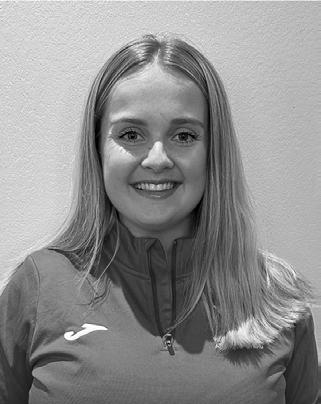
George Ely received the Drapers’ 2024 Bronze Medal
George Ely won the Bangor University Drapers’ Bronze medal for outstanding PGR contribution, adding to the list of previous recipients of this prestigious award.
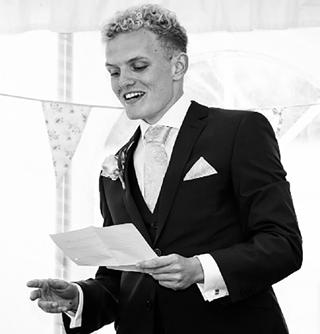
Liam Hardman received a Bangor University Innovation and Entrepreneurship Leadership Team (BUILT) Awards
In partnership with the University’s wellestablished Enterprise by Design (EbD) programme, BUILT is an annual competition open to all Bangor University students where participants across all study disciplines and all academic years form teams of 5-10 to simulate a startup company and to generate ideas and develop solutions for a specific community challenge.
Liam developed an idea to connect local farmers in North Wales to students directly through an online networking and courier app. This would allowed students to collaborate with growers to gain valuable work experience and contribute to increasing the production and consumption of locally grown food.


Nadia Portelli completed the 103km Ultra-Trail Snowdonia by UTMB in May.
The 103km route has an elevation of 6300m. She completed it (non-stop running) in just over 25hrs. Well done, Nadia!

Impressive PGR representation at the European Congress of Sport and Exercise Psychology, FEPSAC 2024 in Innsbruck (15th-19th July).
Eight of our PGRs had abstracts accepted for presentation at FEPSAC 2024 in Innsbruck: George Ely, Charlotte Welch, Joe Varga, Louisa Codd, Charlotte Clare, Liam Hardman, Alex McWilliam, Nadia Portelli.

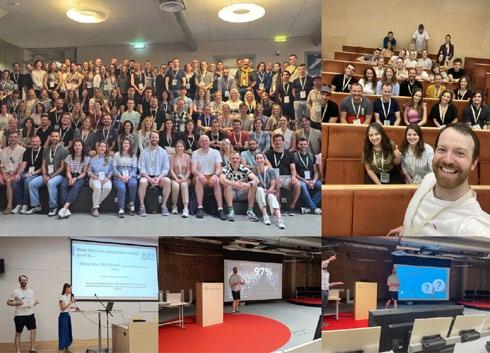
In addition, Louis Molloy presented at the 29th Annual European College of Sport Science (ECSS) Glasgow 2024, July 02 – 05.
Dr. Alex McWilliam defended his thesis in April and in May he won the “Best Presentation” award at the ENYSSP conference in Tallinn. Massive congratulations!
This is a summary of an article by Dr Julian Owen, Lecturer in Sport & Exercise Physiology, and Eloise Kirby, PhD candidate, and is published under a creative commons licence by The Conversation.
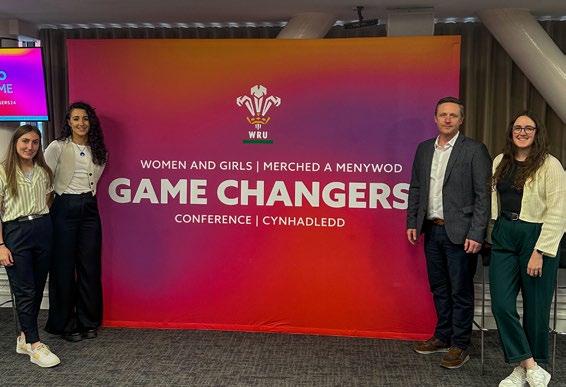
The Women’s Six Nation’s Championship has sparked concern over player injuries, coinciding with a notable increase in women participating in rugby globally. Despite similar injury patterns between genders, female players require tailored prevention strategies. Gender disparities, including lower neck strength and greater head acceleration in females, contribute to concussion risks. Anatomical distinctions in the pelvis, knee, and lower leg can also heighten injury susceptibility in female players, particularly to the knee. Additionally, gender variations in neuromuscular function may impact ACL injuries and concussions.
But is there a greater risk of injury in women’s rugby? Research suggests that common injury types in male and female rugby remain alike, with concussion ranking highest, trailed by lower leg injuries. Elite women’s rugby carries nearly 50% lower injury risk than men’s, with fewer injuries per match. In amateur rugby, both genders face comparable injury risks, albeit lower than at the elite level. Emerging evidence hints at a potentially higher injury burden for females at this level, a product of injury incidence and days missed. Concussion and ACL injuries pose significant risks in rugby. Concussion, a mild traumatic brain injury, occurs more frequently in men’s rugby, possibly due to greater force of contact. However, it constitutes over one-third of injuries in women and less than a quarter in men, with female players experiencing longer recovery times. ACL injuries, more prevalent in elite women’s soccer, are 20 times higher in male rugby professionals. In lower-tier rugby, women face a five times higher rate of ACL injuries, with longer recovery times, akin to concussion.
Several questions persist regarding injury risk in female rugby. For instance, the transition to professionalism in women’s rugby may alter injury risks. The novelty of the sport’s rising popularity may lead women to start participating at an older age, possibly contributing to poorer tackle techniques and increased injury risk. Other factors, like insufficient medical support and the potential influence of the menstrual cycle on injuries, require further investigation. Additionally, breast injuries, prevalent in other sports, lack research in rugby. Despite these uncertainties, it’s evident that women’s rugby demands unique injury prevention strategies rather than adopting approaches designed for men. Understanding specific injury risks in the women’s game is essential for developing tailored prevention methods.
On the basis of this research, our team was invited to the WRU Gamechangers Women’s Rugby Conference at the Principality Stadium in Cardiff.

Understanding the meaning of social interactions is an important human ability that relies on deciphering different kinds of social information. For example, perceiving body and face information, and understanding others’ intentions. Through extensive social experience, adults can understand complex social scenarios with relative ease. By contrast, children must learn to master complex social abilities, and understanding how this is achieved is an important goal for developmental psychology and neuroscience.
A recent collaboration between researchers at Bangor University (Kami Koldewyn) and University of Coimbra in Portugal (Jorge Almeida; Jon Walbrin - previously Bangor University) reveals a striking brain difference between adults and children that potentially explains developmental differences in social interaction understanding. The functional magnetic imaging study - recently published in the Journal of Neuroscienceinvolved scanning the brains of children (6 - 12 years old) and adults (18+) while they viewed brief videos of 2 human figures interacting. Activation responses in the superior temporal sulcus (STS) - a brain area that is involved in the visual processing of social interactions - were measured and combined with measures of connectivity to other parts of the brain. The results show that in adults, activation to social interactions in the STS is related to connectivity to brain areas involved in processing static and dynamic body information; in children however, STS activation is related to connectivity to brain areas involved in making deeper social judgements about other people’s hidden thoughts and beliefs (a process known as “mentalizing”).
Lead author Jon Walbrin explains: “Most previous social neuroscience studies have focused on measuring responses to other people as individuals. But more recently there has been an increased interest in understanding brain responses to others in the context of social interactions. However, very little is currently known about how such responses develop during childhood. These results suggest that children and adults might employ different strategies for interaction understanding: adults rely more on observable, body-based information, while children - with less social experience - engage more in effortful reasoning about what others are thinking and feeling during an interaction. This likely reflects the process of learning to understand interactive behaviour”
Professor Kami Koldewyn added “The current results help us better understand how brain networks involved in social cognition change across development. Most adults don’t need to think to understand social interactions; they get the gist of even complex social encounters simply through information that can be observed directly. Children, who have much less social experience, may need to think about the intentions and feelings of the interactants to understand such social scenes. The changes we see in the networks that support social understanding across development likely reflect brain changes as children learn about the social world, including how to predict and understand the social encounters they observe around them.”
These results are an important step towards better understanding how the brain develops across childhood, and the authors suggest that future efforts should be made to compare similar responses during adolescence as well as later adulthood.
Professor Richardson is a leading authority and advisor in high performance organisational culture, with experience of working with talent pathway professionals within Premier League clubs. This he translates to provide professionals with examples for business environments.
Team success requires more than talented individuals. Traits of a winning team also include good organisation, a coherent culture and strong leadership.
Professor Dave Richardson sees parallels between the cultural alignment needed when recruiting a project team and how English Premier League teams utilise the loan system.
We may hear a lot of sporting analogies in the world of business - ‘getting things done by close of play’ for example, but it’s not just language that business can borrow from sport.
Lessons taken from the sporting world can help companies create a high-performance environment that increases the chance of success. Much has to do with providing clarity surrounding a team or organisation’s culture, roles and responsibilities, goals and purpose. These are the things that bring unity, build team spirit and encourage people to want to succeed together.
That’s why project delivery business Stellarmann sought the advice of Bangor University’s Professor Dave Richardson, Head of the School of Psychology and Sport Science, for their latest whitepaper highlighting the processes at play.
He says,“Cultural alignment is key. You can see the strategic intent in the way players are being placed by Premier Leagueclubs.Theylooktofindtherightenvironmentwhere the player, the coach and the style of play all match up.”
When it comes to building and supporting the team, Dave Richardson says,
“Anyone going into a new environment wants to understand the people they’re going to work with. They will spend time in the organisation and align themselves with the staff.”
“For a young Premier League footballer walking into a lower league club this involves taking the time to get to know their new team-mates, spending time in the canteen and in the gym – whilst learning the language of the coaching staff and observing, and understanding, the nuances of their new environment and the formal and informal hierarchy.”


– HERE’S HOW IT COULD DO US REAL HARM
ThisisasummaryofanarticlebyProf.GuillaumeThierryfrom thedepartmentofPsychology,andispublishedunderacreative commonslicencebyTheConversation
The release of the advanced chatbot ChatGPT in 2022 sparked widespread discussion about artificial intelligence (AI), amplifying concerns about its rapid advancement and potential for uncontrollable outcomes. Some experts and industry leaders have even warned that AI technology could threaten human existence.
For years, I was unconcerned about AI’s impact, viewing it merely as a guide or adviser to humans. However, the idea of AI taking on executive control is troubling. One key reason for not allowing AI to hold executive power is its complete lack of emotion, which is crucial for decision-making. Without emotion, empathy, and a moral compass, AI resembles a perfect psychopath.
The existential threat posed by AI extends beyond scenarios where it controls nuclear arsenals. AI’s potential to cause significant harm exists in numerous control positions. AI is already widely used in information processing and data analysis across various domains, from weather modelling to driverless vehicles and medical diagnoses. Problems arise when we consider elevating AI from an advisory role to that of an executive manager.
Imagine an AI not just suggesting remedies for a company’s accounts but being given the authority to implement procedures for debt recovery, make bank transfers, and maximize profits. Or consider an AI system not merely diagnosing based on X-rays but having the power to prescribe treatments or medication directly. Such scenarios can make one uneasy, likely due to the intuition that machines lack ‘souls’. They are merely programs designed to process vast amounts of information and simplify complex data for human decision-making. They do not ‘think’ and cannot have emotions, which are closely tied to biological senses and instincts.
Emotional intelligence, the ability to manage emotions to overcome stress, empathise, and communicate effectively, is arguably more important in decision-making than intelligence alone. The best decision is not always the most rational one. While AI can be embedded with some form of intelligence to make rational decisions, imagine asking a powerful AI with executive capabilities to solve the climate crisis. Its logical solution might be to drastically reduce the human population since humans are the ultimate source of pollution. This is not a choice human decision-makers would ostensibly make, but an AI could arrive at such solutions, unencumbered by a human aversion to causing harm. With executive power, there would be nothing to stop it from acting.
Consider the potential for AI to sabotage food farm sensors and monitors subtly, leading to famine, or shutting down global air traffic control, resulting in millions of deaths from simultaneous plane crashes. If you think this is a delirious science fiction plot, think again: AI systems already drive cars and fly military aircraft autonomously.
AI could also cause massive disruptions by shutting down access to bank accounts, triggering widespread civil unrest, or by disabling computer-controlled heating systems in winter or air-conditioning during a heatwave. And in fact, AI does not need direct control over nuclear weapons to pose a serious threat, it could fake an attack, triggering a human-initiated nuclear retaliation.
In theory, AI could kill large numbers of humans. Giving it executive powers is the key to making this risk very real. I cannot think of a more terrifying prospect than giving a thoughtless and amoral program the ability to rule life. And I just read that the OpenAI long-term AI risk team has disbanded…
Strict compliance with Covid-19 restrictions during the pandemic is linked to poorer mental health outcomes. The study examined the behaviour of approximately 1,700 individuals in relation to their personality traits and post-pandemic recovery.
Dr Marley Willegers, Dr Ross Roberts, Prof Tim Woodman and Dr Andrew Cooke focussed on two broad personality dimensions: agentic (self-focused) and communal (others-focused). The study aimed to answer three questions: who follows health advice, how can compliance be improved, and what are the costs of compliance?
The study also included a survey of 230 friends or family members to cross-check participants’ recollections of their behaviour. Additionally, 850 participants provided bi-weekly updates on their well-being, stress, anxiety, depression, and infection prevention behaviours over a three-month period between February and May 2023.
Communal personalities, those more sensitive to the needs of others, were more likely to comply with lockdown rules and health advice compared to agentic personalities, who focused on their own needs and priorities.
High compliance with Covid-19 restrictions and greater worry about infection during the pandemic were associated with higher levels of stress, anxiety, and depression post-pandemic, and a lower likelihood of resuming normal behaviour.
Dr. Marley Willegers emphasized the importance of considering personality types in public health campaigns. “If government advertising campaigns want to change the public’s behaviours, they need to take both personality types into account. Campaigns need to highlight the personal costs and benefits involved, not just people’s responsibility to others,”.
The study highlighted a gap in public health messaging: while initial campaigns effectively promoted compliance, there was a lack of support for transitioning back to normal life post-pandemic. Without this post-pandemic guidance, communal and neurotic personality types have retained infection prevention behaviours and anxiety that undermines their mental wellbeing.”.
In summary, the research highlights the need for tailored public health strategies that address the diverse motivations and concerns of different personality types to foster better mental health outcomes as society recovers from the pandemic.


Bangor University are partnering with medical training company Remote Area Risk International and the Institute for Remote Area Risk Management and Medicine, to improve medical care in emergency situations that occur in outdoor and remote areas, such as expeditions, military operations, and humanitarian disasters.
A key focus of the partnership is to develop effective, practical, evidence-based methods that responders can use to limit body temperature cooling during field care and other resource-limited settings.
Staff from Bangor University’s Institute for Applied Human Physiology will attend professional-level remote area medical courses run by Remote Area Risk International at the National Outdoor Centre, Plas y Brenin in Eryri, North Wales. Further research and testing of prolonged field care techniques and equipment will follow, including within a specialist thermal environmental chamber at Bangor University.
Remote Area Risk International is a leader in the field of remote area medical training and risk management, whilst Bangor University has a long track record in world-class research in sport and exercise science.
The research will take place thanks to a Bangor University Innovation and Impact Award, funded by Research Wales Innovation Fund.
“WearedelightedtobeworkingwithRemoteAreaRiskInternational to help develop the practical methods and training they teach in their UK-leading remote medicine and prolonged field care courses. The work is particularly rewarding, knowing that course graduates go on to apply the knowledge and technical skills learned, to improve prehospital care and reduce mortality in resource-limited settings, like expeditions and disaster zones”.
Professor Sam Oliver Department of Sport and Exercise Science, and Director of the Institute for Applied Human Physiology, Bangor University.

“We were introduced to Sam by a trusted and very experienced contact within Mountain Rescue. The team at the Institute for Applied Human Physiology have huge experience in the subject matter in question. As with everything we do, the focus is on making a positive difference to those who need it, in extremes”.
Matthew Davies, Director at Remote Area Risk International
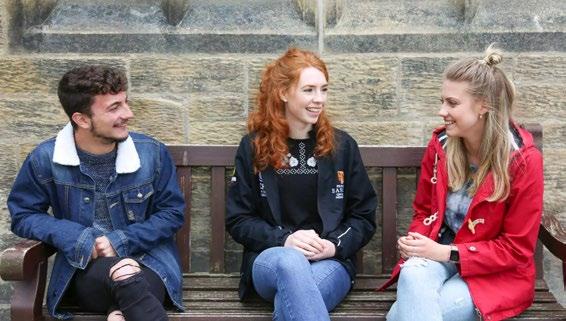
Empathy, a crucial listening skill, is often misunderstood. It involves understanding another person’s perspective rather than sharing their exact experiences. Two people might face similar challenges but react differently, making it essential to listen without assuming identical feelings.
Imagine every person views the world through a unique pane of glass, marked by their genetics and life experiences. This metaphorical glass warps and changes over time, altering their perspective. To be empathetic, one must look through another’s glass, appreciating their unique frame of reference without imposing their own experiences or attempting to fix perceived flaws.
Sympathy, feeling sorry for someone, differs from empathy. Sympathy involves a desire to reduce suffering, but it doesn’t equate to understanding the other person’s feelings and needs. Empathy requires listening and asking about the experiences that shaped the person’s view of the world, without sharing personal stories or rushing to provide solutions.
For instance, when talking to someone afraid of public speaking, rather than offering sympathy or advice, an empathetic listener would ask about their thoughts and feelings during presentations and explore the origins of their fear. This approach helps uncover the root causes of their anxiety, fostering self-understanding and problem-solving.
Practicing empathetic listening reduces misunderstandings, curbs the urge to offer unsolicited advice, and builds deeper connections. This technique is fundamental in therapeutic relationships, where genuine understanding and rapport are essential, but it can also be valuable in many other types of relationships, from family to friends to colleagues. A good listener becomes fully immersed in the speaker’s world, minimizing distractions, and focusing entirely on their perspective. This deep engagement is key to effective listening, helping us to understand and connect on a meaningful level.
This article, written by Professor Fay Short, is part of Quarter Life, a series about issues affecting those of us in our twenties and thirties. From the challenges of beginning a career and taking care of our mental health, to the excitement of starting a family, adopting a pet or just making friends as an adult. The articles in this series explore the questions and bring answers as we navigate this turbulent period of life.
For more information on listening skills and empathy, visit www.bangor.ac.uk/human-behaviouralsciences/news/how-to-be-a-good-listenerand-how-to-know-when-youre-doing-it-right
or you can contact Professor Fay Short at f.short@bangor.ac.uk

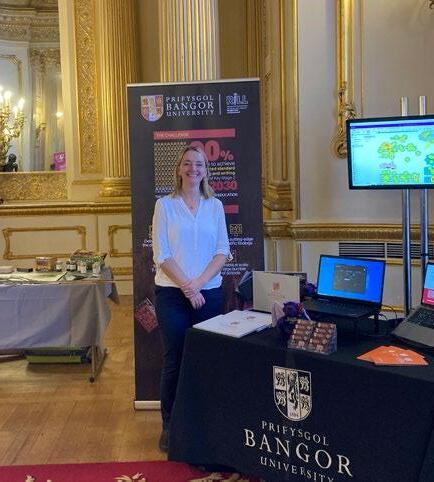
The Research on the Instruction of Literacy with Language (RILL; www. rillresearch.org) project helps primary-aged children to gain key reading skills. It has attracted wide-scale funding and has so far directly helped well over 1,000 children who struggle with reading.
RILL is currently available in Welsh and in English and is being developed by the company Oxford Education and Assessment for wide-spread use across the UK. In October 2023, the PI Professor Manon Jones was invited to showcase RILL to politicians and UKRI leaders at Westminster as part of the Welsh Innovation Network event designed to promote research excellence in Wales.
You can see here a short video of Professor Jones talking about the project.
www.bangor.ac.uk/featured-research-projects?utm_medium=print&utm_ source=TeamBrand&utm_campaign=pm-event-oct-2023#RILL
In February, we met to celebrate our most inspirational, world changing research.
The School of Psychology and Sport Science held their bi-annual Impact Case Study Conference in February, during which staff and postgraduate researchers met to share some of the ‘good’ that the School is currently contributing to society. Presentations focused on emerging impact-related activities and included work from Dr Julian Owen on injury prevention in the female athlete, Dr Stuart Beattie on reducing recidivism in the Youth Justice Service using evidencebased resilience programmes, Dr Ken Valyear on his work developing movement assessment and rehabilitation tools using immersive technologies, and Dr Markéta Caravolas, who talked about her work developing a multilanguage assessment battery of early literacy.
The focus at this stage is ensuring that our research is designed to best represent the needs and priorities of those who might be interested in or use it. “No matter what people tell you, words and ideas can change the world” (Robin Williams, Dead Poet’s Society).
Dr Vicky Gottwald presenting at the Impact Case Study Conference
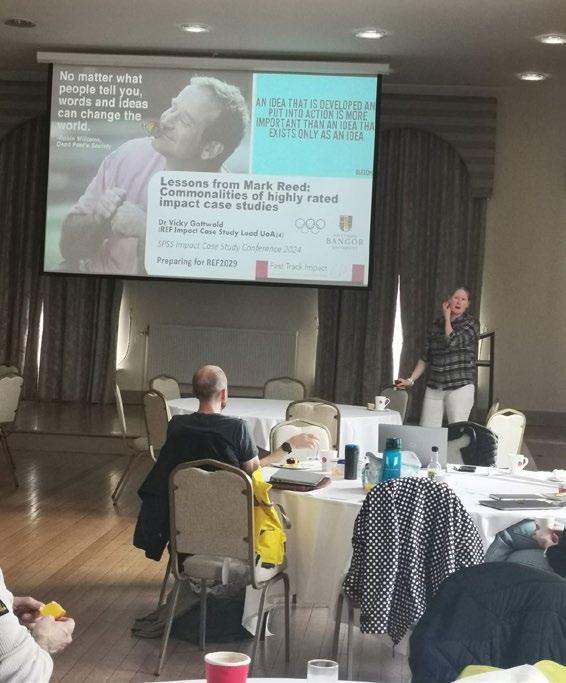
A rapid systematic review for the Public Health Wales’ Behvaioural Science unit
Professor John Parkinson (PI); funded by PHW Public Health
Wales NHS Trust, £4,995
Completion of a systematic review around examples of UK and broader OECD comparable to Wales, applications of behavioural science (defined along the lines of TDF/ COM maybe TTT) used in health inequity reduction interventions (policy through to projects/trials).
Dr. Charlie Wiltshire (PI); funded by British Council, £6,668 opportunities-insight.britishcouncil.org/news/opportunities/%20 strengthen-your-research-links-france-and-germany
To further collaborative links with a team in Munich, Germany.
I will lead the UK arm and Prof. Phil Hoole will lead the Germany arm. The grant also funds mobility for 6 ECRS between our respective laboratories.
Sam Jones (PI); funded by Royal Society, £30,897
Speech perception involves deriving meaning from noisy sound signals and is essential in everyday life. Children show incredible variability in speech perception skills that is attributable to processes in the brain which remain poorly understood. This research project aims to understand these processes by developing a new biologically realistic computer model of the child brain. By comparing the performance of our model to that of 1600 children in a range of hearing and speech tasks, we will be able to understand how the developing brain supports speech processing. We can also damage different parts of the brain model to understand the underlying causes of speech processing disorders, which affect 7-10% of children in the UK and significantly impact educational outcomes. To ensure that our results are as accurate as possible, we will take the innovative approach of administering the auditory assessments to a device known as a head and torso simulator, which is an extremely high-spec mannequin capturing the acoustic and physical properties of the human body. This approach will enable us to administer the auditory and speech tasks to the computer model via the mannequin exactly as they are administered to children. This project is exciting because it blends advanced computational modelling, largescale child data, and head and torso simulation for the first time to tackle a fundamental scientific problem with immediate use for society. In addition to developmental auditory neuroscientists, our results will be of significance to engineers working on hearing technologies like hearing aids and cochlear implants.
Professor Helen Henningham (PI), funded by Oxford Policy Management Limited, £47,438
Over 250 million children under the age of 5 years in low- and middle-income countries do not reach their developmental potential due to poverty, under-nutrition, and a lack of early stimulation. Poor development in early childhood has life-long consequences for individual educational achievement and future income and has implications for national development. There is a strong evidence base showing that supporting caregivers, families, and communities to provide nurturing care can have a positive impact on child development. However, few interventions have been delivered at scale and there are gaps in our knowledge about how to take successful approaches from pilot to scale.
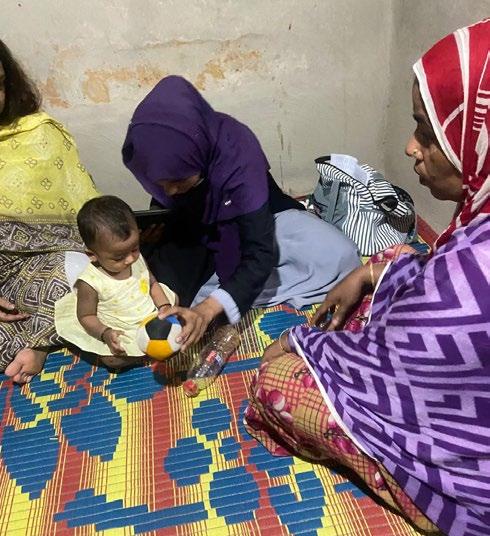
THRIVE is a 5-year, multi-country research program that aims to support countries to deliver practical, scalable, cost-effective programs aimed at promoting young children’s development. THRIVE is working across 5 countries: Bangladesh, Ghana, Kiribati, Tanzania and Sierra Leone.
Professor Helen Baker-Henningham is International PI for the THRIVE portfolio of work in Bangladesh and is working alongside the national PI, Dr. Jena Hamadani and a team of Bangladeshi researchers on several projects.
These projects include:
» Identifying and evaluating strategies for scaling up an evidence-based early childhood parenting program through the primary health care system in rural Bangladesh.
» Identifying appropriate approaches for providing early childhood services with Rohingya families living in the refugee camps in Cox’s Bazaar, Bangladesh.
» Examining the feasibility of establishing quality day-care facilities to promote early childhood care for the mothers who are working within the garment factories in Bangladesh.
» Conducting a follow-up study to investigate whether there are medium-term benefits to child and maternal outcomes from a combined cash transfer and early childhood parenting programme compared to a group who received cash alone.
Helen is also the workstream lead for the theme: ‘disadvantaged and marginalised children’ across the THRIVE portfolio of projects. This workstream aims to ensure programs are designed to better support marginalised children including children with disabilities, children from minority ethnic groups, those living in the poorest and most remote communities and those affected by conflict and displacement. The workstream also includes a focus on preventing violence against children by their caregivers including at home, in day-care and at preschool.
Professor Jamie Macdonald (PI), funded by Help for Heroes, £5,758
Heroes Strive is a web-based platform designed to offer a bespoke user experience for individuals looking to improve their physical and mental health. As Help for Heroes continue to develop the product, they have two key areas in which they need research support:
» User feedback during onboarding and pilot phase of the project
» Evaluation of impact
Dr. Andrew Cooke, funded by Bangor University Impact and Innovation Award (BU-IIA), £30,887
We will develop a performance psychology assessment and support package for emergency medics and this will be embedded into the North West Air Ambulance’s (NWAA) staff training programme. It will deliver operational efficiencies and opportunities for income generation for NWAA, change current policy and practice, and optimize employee performance.
further
- the development of a bespoke mental health screening tool for use within professional cricket.
Dr. Ross Roberts (PI) and George Ely, funded by Bangor University
Impact and Innovation Award (BUIIA), £35,000 +England and Wales Cricket Board (ECB), £20,000
Here we intend to complete a co-funded and co-developed impact project with the England and Wales Cricket Board (ECB – the governing body for Professional Cricket in the UK) whereby we develop a bespoke and cricket specific mental health screening tool. The intention of the ECB is for this tool to subsequently be used as part of their annual monitoring for all professional and academy cricketers (which currently only includes cardiac and concussion screening). Developing such a tool would be something of an industry first as sport specific measures do not exist.
What is particularly relevant in this project is that it is being cofunded by the ECB (i.e., they are funding this project to the tune of approx. 20k to top up the 35k budget from the BUIAA). It is also a project that is designed to invest in future talent, as the project funds are being used to support George Ely to work as a postdoc for a year. Congratulations!

Professor Val Morrison,
The current proposal focusses on the priority areas of prevention, testing, living well with HIV and tackling HIV -related stigma. As such this project sits well with research in health psychology led by Prof Val Morrison, including the study of illness perceptions and behaviour change, and of living with a long-term condition. The innovation offered by this proposal is the use of quilting to engage the North Wales community in awareness raising around HIV infection, increase testing uptake and reduce stigma to enable those affected to ‘live well’ with a diagnosis. In Wales we have a wonderful history of quilting and a strong sense of community grown around ‘quilters’, with family stories, memories and traditions commemorated and celebrated in each square.



Sadly, Professor Roger Eston, who was Head of the School of Sport, Health and Exercise Sciences at Bangor University between 1999 and 2004, lost his battle with cancer and passed away on 9th May 2024.
After leaving Bangor University in 2004, Professor Eston took on Head of School roles in Sport Science departments at the University of Exeter and the University of South Australia, before becoming Pro Vice Chancellor, University of South Australia Division of Health Sciences (2019 to 2020) and Executive Dean: University of South Australia Allied Health & Human Performance (2020 to 2023).
Professor Eston was a world leading researcher and internationally respected academic in sport and exercise science, with around 250 scholarly articles and chapters. He served significant periods on several editorial boards. He produced seminal work on the assessment of physical activity, on exercise-induced muscle damage, and on Ratings of Perceived Exertion. He conceived and developed a number of innovative paediatric effort perception scales and introduced the use of perceptually-regulated methods of controlling exercise intensity in children. With colleagues from Bangor, he also introduced the use of perceived exertion to control graded exercise tests to assess cardiorespiratory fitness in normal and clinical populations.
Professor Eston’s applied work is also well recognised. He was a Fellow of the British Association of Sport and Exercise Sciences, and a former consultant physiologist with the British Figure Skating Team and England Rugby Football Union’s Young Player Development Pathway Working Group; Chair of the Physiology Section of BASES and BASES Physiology Accreditation Committee. His influence in exercise policy is global, being a former member of the UK Medical Research Council College of Experts and Health Research Board, Executive Group of Australia’s Council of Heads of Exercise, Sport and Movement Sciences, and the Exercise and Sport Science Australia Exercise Science Implementation Group, among other groups.
Professor Eston also made a substantial impact on the teaching of nearly all undergraduate sport and exercise scientists. He was a National Teaching Fellow, AdvanceHE, ‘Kinanthropometry and Exercise Physiology’, now in its fourth edition, is used as a standard text around the world because of its commanding clarity and scholarship and is among Routledge’s top selling sports science textbooks. He has also supervised over 60 PhDs/MScs including 20 whilst at
Bangor, and externally examined 35 higher degrees by research. He has examined or provided advice on numerous sport and exercise academic programmes at UK universities (Liverpool John Moores, Brunel, Birmingham, Chester, Manchester Metropolitan, Greenwich) and internationally (Canberra, Hong Kong, Hong Kong Baptist, Vrije Brussels) and has advised on numerous senior academic appointments globally.

The photo was taken in Adelaide, February 2023, after Roger’s cancer diagnosis. Roger is second from right; his wife Gaynor is first from right. The photo is testament to Roger’s positive attitude to life in face of adversity, and very fitting as he supported so many staff and students within Bangor University, including the other two people in the photo, whom he mentored and supervised.
Roger is survived by his wife Gaynor and three children, James, Charlotte and Rich. Bangor University’s flag was flown at half-mast on Friday 31st May 2024 in his memory.
It is with deep sadness that we share the news of the passing of one of our MSci Psychology with Clinical and Health Psychology students, Omanchi Agbaji, on May 25th, 2024. Omanchi was a bright light in our community, and his absence will be felt by all who knew him.
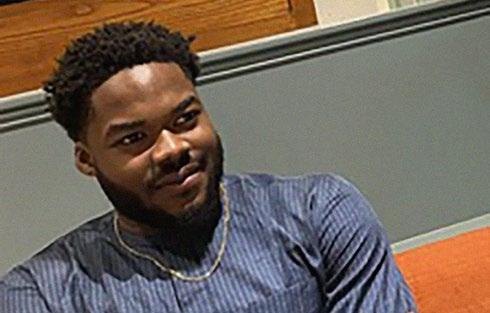
Omanchi was a hugely popular individual, well-known throughout the university community. He was an extremely friendly and caring individual who was passionate about engaging and supporting other students. He was keen to raise any student issues with the University and ran for election in the recent Student sabbatical officer appointments. Omanchi was also active in the local community including his engagement with the North Wales Africa Society. He was a valued member of the student body, well-liked by fellow students in the societies and well thought of by staff within the School. He was an extremely bright and enthusiastic student, with a keenness to engage in academic discussion, challenge and critique.
Omanchi made a positive impression with everyone that he met. He was an advocate for social change and for social good both in our local community and in Nigeria. He was renowned for his ability to warmly welcome new students to Bangor and to light up the room with his infectious smile. He was indeed a shining star and will be sadly missed by us all.
If you have been affected by this sad news, you might wish to draw on your own support networks of family, friends, colleagues and staff. However, University staff are also on hand to support you.
The University’s Wellbeing Services are also available to support you. If you would like to arrange a Wellbeing appointment please email wellbeingservices@bangor.ac.uk. Online support and links to different organisations can be found through the Wellbeing Services webpages. There is also a Chaplaincy Team at Bangor University with several experienced faith representatives who can offer a listening ear and support. They can be contacted at chaplaincy@bangor.ac.uk
I would encourage you to seek support if you need to and to be reassured that you are not alone if you’re affected by this sad news.
Wellbeing Services webpages
www.bangor.ac.uk/ studentservices/ wellbeing/self-help.php.en
The newsletter of the School of PSYCHOLOGY AND SPORT SCIENCE
The latest news from Psychology and Sport Science, staff and alumni Summer 2024 | Issue 1 Thank you for reading